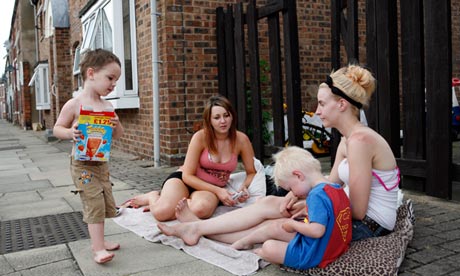Welcome to York, the city that wants to launch a living wage
Many in the beautiful city face a huge affordability gap. Now it's trying to make itself a poverty-free zone

Young families on Hanover Street West, behind York railway station. Photograph: Gary Calton for the Observer
With its Roman walls encircling the city and the Minster dominating the skyline, the ancient city of York can always fall back on tourism.
The aroma of chocolate that used to hang in the air for miles around is far fainter now than in decades gone by. Terry's, producer of All Gold and the Chocolate Orange, finally closed its factory doors in 2005 as manufacturing fell away in this former capital of the north. The great railway carriage works that employed thousands of skilled workers is also long gone. But last week, in the intense heat, the narrow shopping streets were still heaving. Seven million tourists a year visit York. On the surface, at least, it seems to have managed its transition well.
It must, therefore, have been a surprise for visitors to see the front page of the local paper, the Press, last Wednesday and, if they went that far, to read a six-page special report inside entitled Poverty in Focus. The front page was filled with the headline statement: "A century ago, Seebohm Rowntree unearthed the shocking truth about poverty in York. Today problems remain. Child poverty alone costs the city £42m a year and the region £226m. In York, 13,795 live in some of the UK's most deprived areas and typically live 10 years less than those in rich neighbourhoods." The message was that York remains a city of contrasts, of haves and have nots. Money pours in from outside but too much of it doesn't trickle down to those who have been there longest.
In many ways York is a desirable place these days. Less than two hours from London on the east coast main line, the city is a beacon for well-heeled commuters, who buy houses there and travel north or south for work. Its two universities bring 22,000 students into a city in which over 40% of the population is now educated to degree level or higher. It is a place for high achievers and, in many cases, big earners. The unemployment rate is just 1.9%. "We have a southern-style economy based in the north," saidJames Alexander, the 31-year leader of City of York Council.
But Alexander makes this observation more to raise his concern about the city's less fortunate residents than to pat York on the back for its economic successes. Southern-style buoyancy is, he believes, breeding problems in a city where affordable property is in appallingly short supplyand wage inequalities are increasingly stark. Pockets of severe deprivation and poverty are worrying not just its local paper but York's civic leaders as a housing and wages crisis hits the poorest. Of the nearly 14,000 people who live in or near the poverty line, 4,500 of them are children.
A report last week by the Resolution Foundation found that a person on an average income of £22,000 in York would have to spend 34% of their income to rent a modest two-bedroom home, giving the city one of the biggest affordability gaps in the country.
Alexander says the unemployment figures mask a trend towards "under-employment" as people are forced onto part-time contracts, often in service industry or tourism jobs, as cuts and austerity bite. York may be booming for the better off but to those at the lower end the boom feels more like bust.Gavin Aitchison, news editor at the Press, said: "In many ways it is a lot harder to be poor in a rich city than a poor one. A lot of people here are really struggling to get along."
In a city where the legacy of Joseph Rowntree lives on, panic alarms have been sounding. Last week the council, the church, public health officials, local business leaders and the Joseph Rowntree Foundation came together and agreed to commit money and time to a project aimed at making York a "poverty-free city". The civic conscience had been pricked partly by the unexplained death last year of an 11-month old girl, Telan Carlton, who had lived with her mother, and the mother's partner and son, in a one bedroom flat with damp and mould on the walls. The mother believes the appalling conditions were at leat partly to blame for her daughter's death. The story caused a local outcry. At the centre of the new initiative are moves to improve housing supply, create jobs and, crucially, to spread the practice of employers paying a "living wage" to their staff, as opposed to the lower statutory minimum wage. A "living wage" – £7.45 for people outside London and £8.55 for those in the capital – is defined as one that allows a "basic but acceptable standard of living". The current minimum wage is £6.19 for people aged 21 and over.
The concept of a "living wage", championed by Citizens UK and the Living Wage Foundation over the past decade, has been backed by David Cameron, Ed Miliband, Nick Clegg and Boris Johnson but, with none of them advocating compulsion, it is has been slow to take off. The idea is that paying a higher wage is not only morally but economically logical for all concerned. At present the state pays out around £4bn a year to top up the incomes of low earners, a sum that experts say could be halved, or better, if the living wage became the norm.
The Treasury would benefit in two ways. It would pay out less to top up people's earnings, and it would receive more in tax. Low-income families would also have more in their pockets to spend, which could boost the economy. Companies would add to their wage bills, but would benefit through better-motivated workers and lower staff turnover. So far, however, the take-up of the proposal has been limited, with just 124 private companies, 118 charities and voluntary organisations and 45 public bodies – mainly councils – joining the ranks of living-wage employers.
Labour, however, is looking seriously at the idea of introducing living-wage zones or "city deals" in which local authorities which pay the higher rates would receive back a proportion of the savings that accrue to the exchequer so long as they used this money to help private sector companies do the same, through grants and help with training. The idea is expected to be one of the big themes of Labour's general election manifesto in 2015.
The archbishop of York, John Sentamu, puts himself at the centre of the debate over the living wage. Sentamu is to chair a year-long Living Wage Commission to explore what more can be done.
York is an ideal testing ground. In January the Joseph Rowntree Foundation and the Joseph Rowntree Housing Trust introduced their own higher wage system, giving 103 workers a 20% pay rise. One of those who has benefitted is Yvonne Tooby, a care worker at the housing foundation's care home in New Earswick on the outskirts of York. "It has made a real difference to me. If I was on the minimum wage I couldn't pay the bills. It does make me appreciate where I work too. It is a lovely place."
City of York council has also begun paying the living wage, as has insurance company Aviva, which has offices in York. The universities are planning to follow suit.
Neal Lawson, chair of thinktank Compass, which is setting up the Living Wage Commission, said it is time for people and communities to give the lead to politicians rather than vice versa: "The place of initiatives like the Living Wage Commission shows how the world of politics is changing. Broad and unlikely alliances, such as those between faith organisations, academia, business and civil society, now start explicitly outside the Westminster bubble. If you want to effect change, the last thing you want is the association with mainstream national politicians."
LONG HISTORY
The living wage has a long and rather unsuccessful history. In 1894, the Liberal MP for Dewsbury, Mark Oldroyd, failed to persuade his fellow politicians to support the idea. More than 30 years later, James Maxton, a Labour MP, introduced a bill to the Commons for a living wage to "maintain human beings in decent comfort". The bill did not become law and the concept disappeared from the political landscape for much of the 20th century.
It was only in 2001 that the idea resurfaced, in a campaign led by the community organisers of charity London Citizens. The calculated hourly UK living wage in London is £8.55 and £7.45 outside the capital – considerably more than the legally enforceable minimum wage, which from October will be £6.31 an hour for over-21s. It is currently £6.19. For workers between 18 and 20 the minimum wage is £4.98 and £3.68 for under-18s.
Daniel Boffey

Nenhum comentário:
Postar um comentário